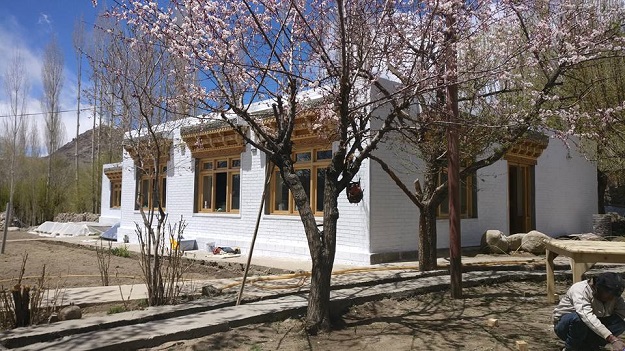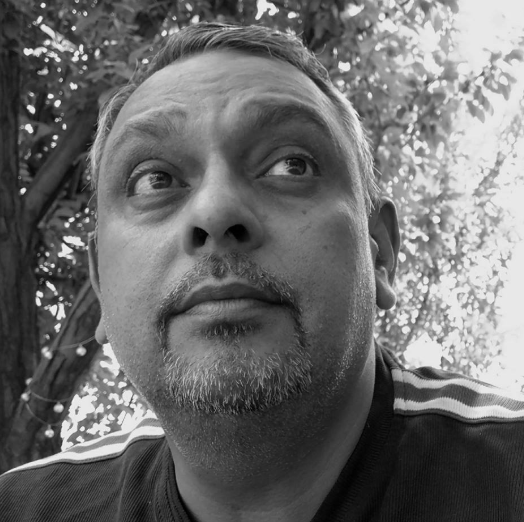
In this series, I will talk to people who have taken a leap of faith, pursued their passion at a great cost or are balancing their passions with a life that makes it extremely hard to follow those passions. These people should not be seen as heroes or ideals. But they establish that more is possible, alternatives are worthwhile and there is no single lens to look at people and measure them.
The series starts with Shivendra Sharma who quit his job at World Bank to start a restaurant in Gurgaon. He then moved to Leh to start Chalung House – place where you can stay and try his eccentric food. Why eccentric? Because he follows no recipes and no-so-shyly accepts that he can’t cook the same dish twice in the same way. Let’s hear from him.

1. Tell us about Chalung House. What is the idea behind it and where is it today.
Chalung House happened by accident. I was searching for a suitable house in Leh to live in with a room to spare for family and friends and some land around to grow my own vegetables. Café TBQ was the main idea conceived as a farm to table extension of the tasallibaQsh concept I implement in Gurgaon.
What I found and liked was this nicely built unit with four rooms and a big kitchen with a large dining hall with plenty of land around to grow vegetables. It came with a dozen apple trees and a couple of apricot ones with an unobstructed view of the Stok Kangri mountain…like a farm house in Leh, very unlike what you usually encounter. Family houses have names in Ladakh and this one’s was Chalung. Having the two spare rooms I thought of running it as a farm stay under the name Chalung House. Next year I will have nine rooms under the farmstay.

Café TBQ operates in the fields under the trees and often in the dining hall of Chalung House if it’s two windy or cold outside. On a personal level, TBQ is a journey to explore and arrive at an understanding of food as we experience it now and have over time since the discovery of fire. On another level it is my attempt to come up with a comprehensive Indian cuisine which is truly representative of the diversity of produce, spices, eating habits, geographic influences on techniques and methods evolved, etc. not in a disparate regional manner but as one composite cuisine.
The quality of produce is therefore of primary significance at TBQ and one of the reasons for setting up the seasonal eatery in Leh where the growing season is very short but the soil and conditions are perfect for a healthy harvest of fruits and vegetables. That coupled with the availability of some of the best meat in the country from mountain goats and sheep provides me the perfect incentive to setup a food lab that focuses on extracting as much of the original flavour from the primary produce instead of trying to put flavour into it.
It’s growing slowly by word of mouth as the concept is very new for Leh. I expect it to start doing well from next season which will be the third here. I idea would be to market it more to individual tourists so that they are aware of it before they get to Leh and seek out the experience. The trade is organised such here that the tourists usually leave it to the tour operators to decide on where they eat. The tour operators obviously are looking to maximise their earnings and hence omit my place generally. In India, how much carbs you use in the menu defines profitability in the restaurant space…a bowl of pasta or thukpa can fill you up quickly and costs me nothing to make…and you are willing to pay a good price for it. My menus on the other hand skimp on carbohydrates and focus on protein and fibre content, and are hence more expensive.
2. Do you have any training in cooking? Do you think the rise of ‘passion chefs’ is changing the food landscape and how?
In the formal sense I have no training in cooking whatsoever but I was always curious about it and am told as I child I used to assist my mother especially around festival times like making gujiyas before holi and such like. I have imbibed a lot of my mother’s approach to cooking…no wastage so almost all peels were cooked and she was very experimental with it. Apart from that I think I have a very open tasting palate which has stands me in good stead. That coupled with my work assignments in the other world which exposed me thoroughly to some of the finest culinary traditions notably that of France, Spain and Italy and having had the opportunity to travel really extensively across India, Nepal and Sri Lanka for work shaped my culinary mind. I am much of a reverse engineer when it comes to food. Cooking was always in the background for me since I had my first kitchen while doing my masters in Ajmer. I used to cook for 30-40 people for parties that we used to throw. Even during college, I with some cousins used to take up stalls at festival fairs in South Ex, Panchsheel and Sunder Nagar just for the kick of it.
At first I thought, I wanted to run a regular restaurant so I bought into one only to realise that it’s a very different ball game and food is a very small part of it. So I got out of that and embarked upon the tasallibaQsh concept…a table for eight diners operating on weekends using seasonal as well as regional produce from all over the country and around. I thought of Leh because it’s too hot for me to work in a kitchen during the summer months in Gurgaon and I had lived in Leh earlier hence knew that there was space to do something interesting during the short growing and tourist season.
I think globally ‘passion chefs’ are around since a long while. Maybe in India we are venturing out now because so far everything was either an investment or a livelihood activity…we weren’t taught to seek and follow our passions. I do hope that this rise will lead to a refining of the Indian cuisine as has happened with other celebrated cuisines such as the French and Italian. Most classical cuisines were tailored for a diet fit for high physical exertion livelihoods or for celebrations…ours still is but this needs to change in keeping with changes in lifestyles and improved understanding of the science of food.
3. You cook with a lot of ingredients from the hills. I have tasted so many chilies, cheese and dried meats etc. How did that happen?
I was always a mountain person…the family is from Dehradun so the food at home was from the hills. Then my extensive travels for work in Nepal rekindled a flame that was alive somewhere to explore the mountains. Since 2010 I have lived and trekked, climbed through high altitude mountain and hilly areas in Nepal and India. It is through this exploration I came upon local grains, spices, chillies and cooking and preservation methods the allowed me to connect all mountain areas. So cheeses, smoked and cured meats and sausages that I once thought were western are actually all very local.
In India, our understanding of the mountains is very limited. Think about it, we have not created one ‘hill station’ since the British left…and what they left us with still sustains (though bursting at the seams now).
I use as many of these ingredients and methods of cooking as possible to generally improve our understanding of mountain cultures.
4. You worked as a consultant with the Word Bank. How and when did you make the shift to food as a career?
That happened by chance…and was the final nail in the coffin of my work in the development space. Until then I was hoping to work just enough to finance my wanderings and wander the rest of the time. It seemed like a good fit but over two years I realised how little I was achieving either for others or for myself. So after finishing with IFC I decided to try to live of my passions, hence the shift to food. So in 2015, I bought into a restaurant but within a year realised it was not what I wanted to do. So sold it off in 2016, started tasallibaQsh on my terrace and then fate brought me to Leh to setup a fine dining restaurant for someone else. That’s where the idea of making TBQ seasonal and moving to Leh for the summer came to my mind. The last years were about making the investments needed and am hoping that I will start to have a net surplus from next year.
5. More and more people are quitting corporate careers and many more dream to do what you are doing – move to an ‘alternate’ career. What will you advise them?
I have shifted career paths numerous times…after a B. Sc. Zoology (H) and an MBA Finance…I have worked in financial markets, corporate and project finance; imported and supplied bulk drugs; managed a garment export unit; set up an IT firm supplying hardware and setting networks in the early days of the internet then moved to microfinance, then setup a social enterprise promoting rural livelihoods and now this.
I guess more and more people are realising that a job or a corporate career only allows you to live a packaged life and once in a while a packaged adventure (that too with all risks removed). I have no advice for them…life is an adventure, if you are up to it and if you have it in you…go live it full throttle. It’s bloody hard and nothing is secure…and you may never truly succeed to become a hero or a millionaire (no harm in entertaining the thought once in a while though) but I live, eat and sleep very well. And change whenever that stops happening.